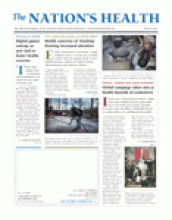Nothing can compare to the joy you feel when your newborn is placed in your arms for the first time. Overwhelmed and utterly amazed, you gaze lovingly into that tiny face, wanting with all your heart to give your child the healthiest start in life.
One of the most effective steps you can take to protect your baby’s health is to breastfeed. The greatest first gift you can give your child, breast milk contains disease-fighting antibodies that can help protect her or him from infections and illnesses. Health professionals agree that human milk provides the most complete form of nutrition for your baby.
“When your new baby is born, it is a motivating time for a lot of people to start making changes that are healthy, and starting with breastfeeding is an incredible way to start a healthy habit that will last a lifetime,” says Pawtucket, R.I., pediatrician Laura Viehmann, MD, FAAP. “It’s healthy nutrition. It’s a healthy start for the baby’s digestive system, a healthy start for the immune system and it’s the foundation for a trusting relationship.”
For most babies, breast milk is easier to digest than infant formula. Most infant formulas are made from cow’s milk that has been altered to resemble breast milk, but they don’t match the exact chemical makeup of human milk — especially the cells, hormones and antibodies that fight disease.
“The key is that human milk is made for human babies, and anything that’s manufactured in a plant, no matter how many scientists have been involved, it’s not human milk so it can never be the same,” says Viehmann, who serves on the executive committee of the American Academy of Pediatrics’ Breastfeeding Section.
Breastfeeding is not just best for babies: It has a range of health benefits for moms, too. Mothers who breastfeed are at lower risk for developing Type 2 diabetes, breast cancer, ovarian cancer and postpartum depression.
The American Academy of Pediatrics recommends that babies be fed nothing but breast milk for the first 6 months of life, and that they continue breastfeeding until at least the end of the first year of life, as other foods are added. After one year, a mother should continue breastfeeding for as long as she and her baby mutually desire it, Viehmann says.
Don’t give up too soon
Despite the many health benefits, many women stop breastfeeding or add other foods or liquids to their babies’ diets well before the child reaches 6 months of age. According to the U.S. Centers for Disease Control and Prevention, three out of four U.S. mothers start out breastfeeding, but at the end of six months, breastfeeding rates fall to 43 percent, and only 13 percent of babies are exclusively breastfed for six months.
Breastfeeding can be challenging, and many moms need lots of support and guidance, especially at the beginning. Success starts with having confidence in yourself. Breastfeeding is a learned skill that requires patience and practice. Other things you can do to prepare for breastfeeding include discussing your plans with your health care provider during prenatal visits. Ask if the facility in which you plan to deliver your baby has a program in place to support successful breastfeeding. Also, you and your partner should enroll in a breastfeeding class where you’ll meet other parents and be able to ask questions well before your baby arrives. And don’t minimize the role spouses, partners, friends and family play in supporting you and cheering you on.
“It’s going to take two or three weeks for many moms and babies to feel confident that they have the hang of it and that they know what they’re doing,” Viehmann says.
The need to return to work is one of the most common reasons mothers don’t initiate breastfeeding. Working moms who breastfeed tend to do so for shorter periods of time than their stay-at-home counterparts, Viehmann says. Check with your employer about finding space to express and store your breast milk.
Need more help? Pediatricians, obstetricians and breastfeeding support groups are all eager to share information. You might also want to reach out to a professional breastfeeding specialist, called a “lactation consultant.” Or call the National Breastfeeding Helpline, offered by the U.S. Office on Women’s Health, at 800-994-9662.

Photos and art courtesy iStockphoto: Mom and baby, Jose Girarte
How does breast milk help babies?
Breastfeeding protects babies from a range of infections and illnesses, including diarrhea, ear infections, stomach viruses, respiratory infections and childhood leukemia. Moreover, breastfed babies are less likely to develop asthma, and babies who are breastfed for the first months of life are less likely to become obese. In fact, a baby’s risk for becoming an overweight child goes down with each month she or he is breastfed.
- Copyright The Nation’s Health, American Public Health Association









